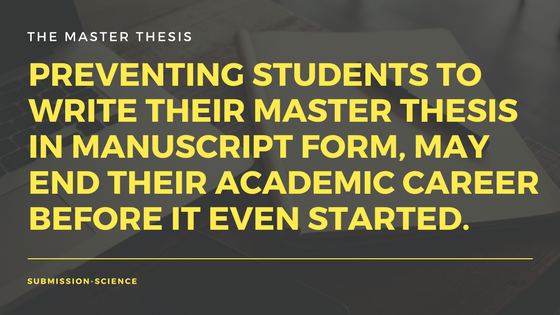The master thesis: An unused opportunity in academic training?
We study to earn experience at a specific topic that hopefully will turn into a job afterward. But those of you who study in the sciences also receive profound general academic training. Yet, the student’s final work – the master thesis – is often written in ways that are detached from academic reality.
If we want the students to work and think scientifically, shouldn’t we also ensure that their thesis writing is as close to academic reality as possible? In practice however – at least in my discipline – many supervisors let their student write their theses in monographic form – often even in their native language. What may have been en vogue in the past is a lost opportunity in today’s publication-driven academic world. And I think it’s the thesis supervisors responsibility to be as close to academic reality as possible.
What do I mean with opportunity? Well, as a student you may be primarily interested in a good final grade after years of studying that includes a good grade of your thesis. As such, you certainly rely on your supervisor’s expectations and his/her style of how a thesis should be written (maybe there are even university rules that have to be followed and which are hard to bend). But you should go beyond than only to max out the grade.

The first thing to mention is the audience who is reading your work. You spend months in data collection, analysis and finally writing everything together into one coherent piece – probably the longest piece of text you’ve ever written so far. Wouldn’t you like that people are actually reading your contribution to science? Again, in past times written monographs may have gained some attention beyond the inner circle of your supervisor but in today’s academic world, scientific literature that is not published in peer-reviewed international academic journals are hardly recognized at all. Which means, a monography will be read by your supervisors for grading and – if you’re lucky – gets in part recycled in their own research. And that’s it. No one else will barely recognize it. Do you really want to spend months of your energy to have two readers? Or ten at best?
With publishing your thesis in a peer-reviewed journal you access your work to an international academic audience which will boost your chances that (many) more people outside your supervisors’ network or their university libraries will have a look into, or will benefit from, your work. A publication truly is a contribution to world’s knowledge and part of your creative energy becomes literally immortal as it will still be accessible (and probably useful for others) long after you passed away. Wouldn’t it be much more satisfying to know that more people will read (and use) the work you spend so much time working on?

Another opportunity fully unfolds if you see yourself pursuing an academic career. Your master thesis is where it starts! It doesn’t start with a defended PhD – not even when starting a PhD – it starts with your master thesis (or even with your Bachelor’s). From my own experience (applying for PhD and PostDocs) as well as from committee work, having a published master thesis will bring you on top of the application list. Every applicant has a Master thesis (or even more) – but few have publications. With publications, you show that you have obtained a much-needed skill set for launching a successful PhD, which means less risk for the PhD supervisor as they see that you can do it and you have at least earned first experiences. Not having anything published already disqualifies you from succeeding in many of the very competitive PhD fellowships. You may think a good grade will do the job. But when it comes to PhD positions, publications outweigh grades by magnitudes – even though having both will be the golden way. I can promise you that from my own applications and by learning first-hand how committees select their candidates! Which brings me to the responsibility your supervisor has in this regard.

As a supervisor, you may or may not like the publication-driven academic world – but that is not the point. The reality is that writing publications requires a skillset of utmost importance in academia and the only way students can prove that they have acquired this skillset is through writing a publishable piece and not a monography with a multi-page description of their study organism. The latter is simply improper academic training; under current academic standards at least (even though that may differ from discipline to discipline – I admit: I’m biology-biased here). By preventing students to write their thesis as a submittable manuscript you may terminate their academic career before it has even launched. At best you make the academic start unnecessarily rough for them. Simply face this reality. Some colleagues may argue that it’s too difficult for the student to write such a piece and that it will therefore not turn out to be successful in the end or means a higher workload for the supervisor. Well, that might indeed be the case if you – as a supervisor – have more master students to supervise than weekly working hours. It requires proper academic training throughout their course-work which not all universities have. But simply saying it’s too ambitious (or too hard) for the student misses the point. Don’t expect the student to do all the writing alone. Don’t expect the student to deliver a publishable output without further input by the supervisor. How do you write your papers? I bed mostly together with your coauthors. That’s the scientific reality. Letting the student writing everything on their own – as they would probably do when writing a monography – is simply beyond our own academic standards.
Also, what else would a supervisor do with the work done by a master student? Option one is that this work will be part of a larger research project that will end up as one piece of a larger publication. Here, indeed, the original content may have largely been rewritten to fit the broader context of the overarching research project. I doubt that option one occurs very often. Option two is that the supervisor will use the data to publish a paper by him- or herself. I know examples where this was state-of-the-art and where master students were surprised that they could own first authorships or authorships at all as some labs have a very doubtful practice of preventing master students their right for authoring their own intellectual property. I want to believe that this is also not very widespread but I don’t know any quantitative measures except some examples where this actually happened. The third option might be the most common one. The work will be not further processed after the thesis is submitted and land on a garbage place for broken ideas, unfinished manuscripts, and lost opportunities.

Why is that? Perhaps it was some preliminary work or a proof of concepts with some flaws that prevent from publishing. Ok, it might be worthwhile to outsource some risky ideas to a thesis topic – even though I find this morally quite doubtful for the student (as this might be his/her launch of an academic career which we invest training in). Maybe it was a not publishable thesis topic from the beginning. A low sample size, a weak study design, or outdated methods may lead to scientific work that is worth nothing. Again this is morally highly doubtful to expose a student to a potentially toxic thesis topic that ends a career before it had the chance to fledge. In either case, the supervisor has failed in taking the responsibility to ensure a high quality work for the student. In fact, the supervisor did not do his/her job properly. At the student’s cost. Finally, the written work might be stuck after the student submitted his/her thesis because peer review often takes longer than a master thesis is allowed to last and the student is not available or interested anymore to do the revisions while the supervisor lacks time or experience to do the revision adequately. Well, this is the only situation I can foresee that a final publication can get stuck for good reason and the probability for this to happen (i.e. revisions that are only possible by the master student that is now busy elsewhere) may be very low in the end.
I think we could all do a better job when it comes to the master thesis. Having the master thesis written in a submittable format should become the golden standard to finish the study of a scientific discipline where publications are the academic currency as this is perhaps the most important skill one can learn for academic training. In a sense, I was very lucky, back in 2012, that my thesis supervisors allowed me to write my thesis in manuscript form. It finally turns into two peer-reviewed papers – one technical from an appendix of my thesis next to my main thesis work. Indeed, it took several years before the paper became eventually published in a well-respected journal – after several rejections and breaks because other things ranked up in priority for me. But now they’re out and they were so important for my academic career.
Also, my first master student I supervised just published her master thesis work in a fantastic journal for which she was even awarded. Yes, it took time. Yes, it was far from what one could expect from a student. But sweat and tears finally paid off and now she has the best possible circumstances to enter the academic world.
If you ever consider me as your supervisor be warned that I might hold high standards. But if everything turns out well you will come out of your thesis with a contribution to world’s knowledge people can access and eventually will read (rather than just your supervisors).
Call me naïve but as we all do, I learn from experience. And my experience – including those made by others – tell me to critically rethink the way we currently deal with the master thesis as such and until I’m proved wrong I will do my best to ensure high-quality supervision.

